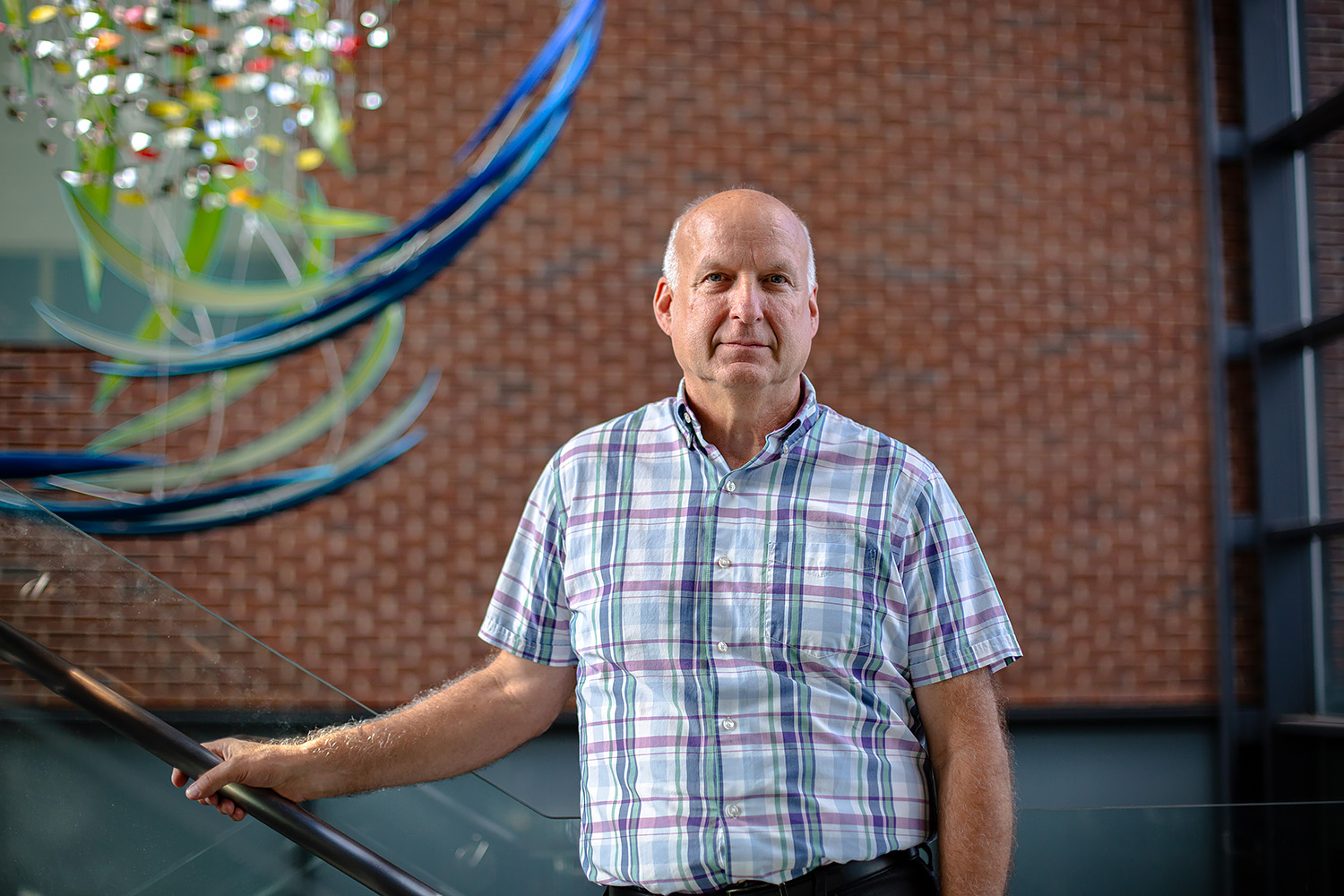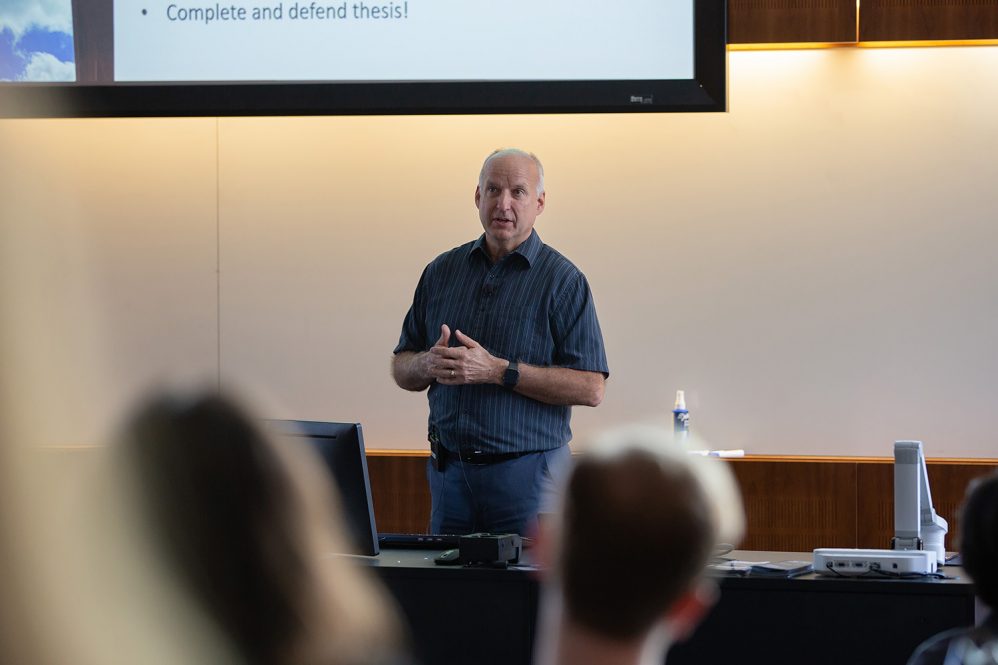Associate professor Randy Walikonis assumed the role of head of the Department of Physiology and Neurobiology (PNB) on Aug. 23, after previously serving as interim head. With more than two decades of teaching experience, he hopes to promote “deep thinking” about science — while setting students up for success through hands-on learning.
“We want the physiology and neurobiology major to allow students to satisfy their curiosity about biology,” says Walikonis. “[They] can think critically and learn how to investigate the big questions.”
Walikonis’ arrival comes at a pivotal moment for the department. In the past five years, the PNB major has seen a 27% increase in undergraduate enrollment. As faculty expand course offerings, they’re also navigating new challenges with federal grant funding.
We caught up with Walikonis to learn about his research, goals, and advice for those looking to enter the growing field.
What drew you to UConn?
I arrived at UConn in 2001. I was finishing postdoctoral training in California and was primarily focused on finding an academic position in the western U.S. However, I was invited to visit UConn, and that completely changed my plans! I was impressed with the high-level science that was conducted here as well as the vibrant atmosphere and collegiality of the faculty and students. When I was offered a position, it was an easy decision to accept.
How has the department evolved since you joined?
The scientific techniques we use in our research have evolved so that we can ask increasingly sophisticated questions. For instance, we now can understand the genetic profile of individual cells, manipulate the activity of individual neurons or circuits in the brain in behaving mice, and readily test the effects of disease-related gene mutations on the function of cells or tissues. We can understand how networks of genes, proteins, and cells integrate for normal physiological function. It’s an exciting time to be studying physiology and neurobiology!
PNB has become a very popular major. The way we teach and our course offerings have evolved. We’ve created laboratory courses that more closely mimic real research, developed courses that cover recent advances in our field, and adapted the way we teach to promote deep thinking about science. We also started a successful graduate program in Intraoperative Neuromonitoring to train students how to conduct neurophysiological measurements in the surgical environment.

Can you tell us about your research and teaching?
My research is aimed at identifying and characterizing proteins that take part in communication between nerve cells at tiny specializations called synapses. When nerve cells are very active, the synapses can be modified in ways that change how efficiently they communicate, a process that is important in cognition, learning, and memory. We identified many of the protein building blocks that construct synapses.
It turns out that mutations in nearly any of these synaptic proteins can cause neurological deficits. I’m particularly focused on a protein called IQSEC2, which helps regulate synaptic modification. Mutations in IQSEC2 are a significant cause of intellectual disability. We continue trying to understand the role of IQSEC2 in synaptic transmission and how mutations in this protein contribute to cognitive deficits.
I teach an advanced undergraduate course called Biology of Nervous System Diseases and a graduate course on Cellular and Molecular Neurobiology. In these courses, we investigate the normal function of brain cells at a molecular level and learn about neurological disorders from the gene and protein levels through cellular, circuitry, and behavioral levels. We know a lot about the effects of mutations or environmental insults on brain function and disease, but there is still so much to be discovered.
Why do you believe studying physiology and neurobiology is important?
Apart from being a great background for students interested in research or medicine, studies in physiology and neurobiology provide a deep understanding of how the body and brain function. This can be important as a person makes medical or lifestyle choices. It can also spark curiosity about a huge range of topics, including our evolutionary relationships with other species, how the brain controls behavior, and how we approach studying or treating disease. We’re in an era in which medical disinformation is rampant. Understanding physiology and neurobiology at a deep level and learning how to think critically about biomedical information can help people separate fact from myth.
What is a common misconception about your field?
That we already know all there is to know about physiology and neurobiology! Students have so much information to learn in our classes that it is easy to conclude that everything there is to know about the body and brain has already been discovered. However, when students get into more advanced classes and dive into the primary literature and research, they find that solving one question leads to many more questions. We need students to be involved in research and to push the boundaries of knowledge.
We’re in an era in which medical disinformation is rampant. Understanding physiology and neurobiology at a deep level and learning how to think critically about biomedical information can help people separate fact from myth.
Where do you see the department heading in the next five years?
Our faculty have been very successful in obtaining federal grant funding due to the quality of our research. However, this has been a challenging year for biomedical research due to changes in funding practices at the National Institutes of Health (NIH) and National Science Foundation (NSF).
One of the immediate goals for the department is to adapt to those changes, so we can maintain the quality of science that our department is known for. This is also important for our graduate program. Our research success directly supports the breadth of the graduate education we offer. We want to ensure that our students get experience in cutting-edge techniques and gain critical thinking skills that will ensure success in their scientific careers. In addition, we are exploring ways to expand our intraoperative neuromonitoring program.
We will also be evaluating our undergraduate program curriculum and expanding the courses we offer. As the number of students majoring in biology and PNB grows, we must make sure that they get the courses and hands-on training they need. I hope to also enhance the connections between our faculty and PNB undergraduates.
What has been your most meaningful mentorship experience?
A biology professor took a personal interest in me when I was a student. He saw potential in me, provided advice, and put me in touch with scientists that could guide me to the next steps in my training. Those small things made a tremendous difference in my journey to pursue an academic career in neurobiology. We have remained friends ever since, and he asked me to be the speaker at his retirement celebration.
I truly enjoy getting to know students. I try to give them that same degree of attention and do the small things that have a big impact on their careers. I like hearing from former students who have gone on to careers in research or the medical field about how their experience in PNB set them up for success. I get those calls and emails regularly, which I find to be particularly gratifying.



